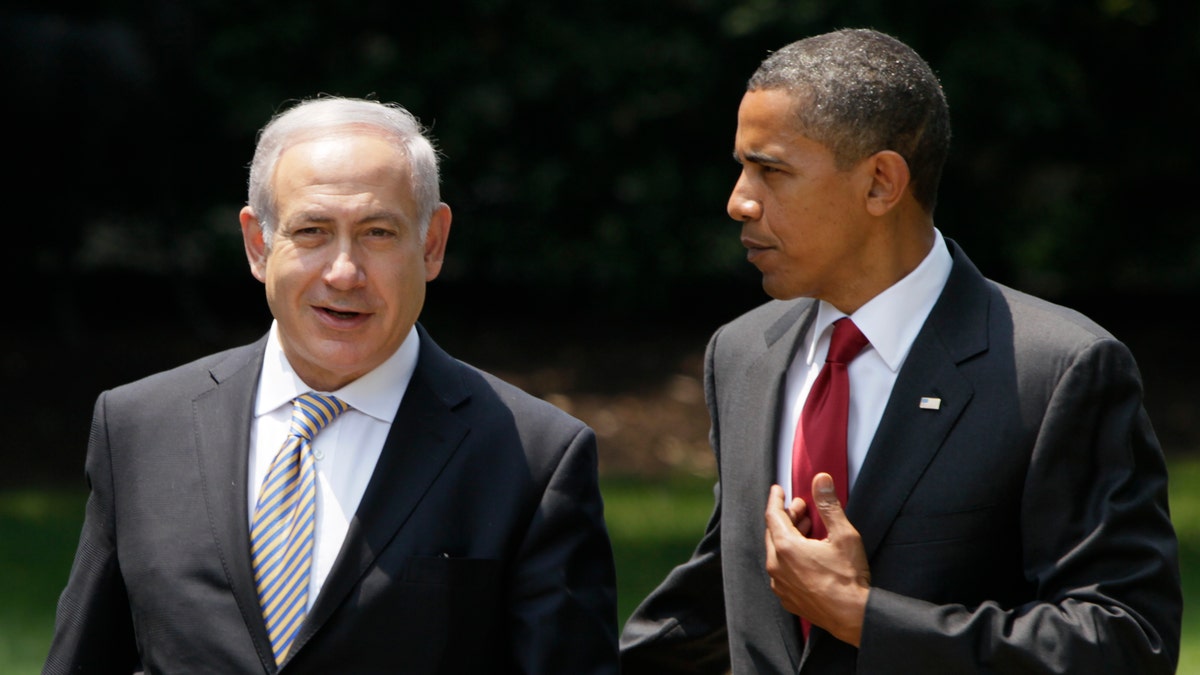
FILE - In this July 6, 2010 file photo, President Barack Obama talks with Israeli Prime Minister Benjamin Netanyahu as they walk to Netanyahu's car outside the Oval Office of the White House in Washington. After a long and chilly four years, Barack Obama hopes to reset his relationship with Israeli Prime Minister Benjamin Netanyahu with his first trip to Israel as president this spring. And it could be a step toward reopening a pathway toward peace between the Israelis and Palestinians, although Obama is carrying no big new Mideast peace plan(AP Photo/Carolyn Kaster, File) (AP2010)
Israel's borders are surrounded by minefields. President Obama's forthcoming trip to Israel will put him into the middle of a figurative one. If he makes it back from his March sojourn to Israel without stepping on one or more of them and setting off diplomatically damaging blasts, that will be a significant accomplishment.
Right now, the government of Israel has two major preoccupations. The first is Iran, which is making steady progress toward obtaining a nuclear weapon even as its leaders threaten to wipe the Jewish state from the map. The second is Syria, where the carnage threatens to spill over borders, with the spectacle of Syria's stockpile of chemical and advanced weapons falling into the wrong hands.
President Obama has expressed a good deal of sympathy for Israel's position on both issues and professes to understand its fears. But his policies have not matched his rhetoric. His slow ratcheting up of sanctions on Iran, accompanied by fitful attempts to engage the ayatollahs, does not appear to have slowed Iran's nuclear progress in the least. And the President, against the publicly stated preferences of his top advisers, has refrained from intervening even in limited ways to influence the outcome in Syria.
[pullquote]
On both Iran and Syria, Israelis do not see President Obama as a sufficiently forceful or stalwart ally. Benjamin Netanyahu, Israel's prime minister, will try his best to stiffen his American visitor's spine.
President Obama has a preoccupation of his own that he will press. His objective is to restart the peace talks between Israel and the Palestinians that have broken down for most of his presidency. His ultimate goal is nothing less than establishing a Palestinian state on the West Bank of the Jordan River. The idea behind this initiative is that the Middle East will be a more tranquil place if the Israel-Palestinian conflict can finally be resolved.
But some question marks dangle over the prospects for such an outcome. The terrorist group Hamas holds a great deal of influence among Palestinians, and with even the "moderate" Mahmoud Abbas, chieftain of the Palestinian Authority, encouraging hateful incitement against Israel, the possibility of significant progress remains slim.
At the same time, it is obvious, as we look at events in Syria, Egypt, Tunisia, and Libya, that the central issue in the Middle East is not the Israel-Palestinian divide, but the divide among Arabs themselves. The Arab Spring began with high hopes, but it has ushered in opportunities for Islamists of various radical stripes to come to power. It is the battle now raging between Islamists and their opponents, and between Sunnis and Shiites, that is going to shape the Middle East far more than anything else.
President Obama’s trip to Israel will serve a very useful purpose if he recognizes these realities. That would mean, to begin with, speaking openly and truthfully about the real conditions and dangers in the Middle East. It would also mean not pressing Israel and the Palestinians to move faster than the situation on the ground can sustain. Incremental progress can be made. A final settlement is not in the cards.
President Obama 's visit to Israel will be judged successful if he returns from the region having made it completely clear to Israel's enemies that America will stand by our ally Israel against those who seek to destroy it. It is precisely his failure to signal strong support for Israel over the course of his first term that has misled radical forces in the region into believing they could exploit a Washington-Jerusalem rift.
The necessity of undoing that damage is precisely why the president should set his sights on addressing the Iranian nuclear program. Having declared that a nuclear-armed Iran is unacceptable, he needs a policy to match his words. If Israelis are not persuaded of his seriousness, they will be increasingly tempted to act on their own to address a threat to their very existence. The prospect of a major war in the Middle East should be sufficient to focus the President's mind on the need to apply enough pressure on Iran so that a peaceful solution is achieved.
As for a final settlement of the Israeli-Palestinian conflict, the Israelis can be encouraged to place a lighter footprint in Palestinian territories. Palestinians can be pressed to halt their incitement and do more to counter terrorism. But trying to solve the conflict once and for all is likely to be counterproductive in ways that blow up in everyone's face. If the president is determined to enter this particular minefield, all Americans should pray that he knows a safe path forward.
Robert L. Dilenschneider is the Chairman and Founder of The Dilenschneider Group, a global strategic advisory and public relations firm, headquartered in New York.
